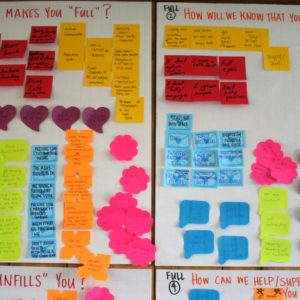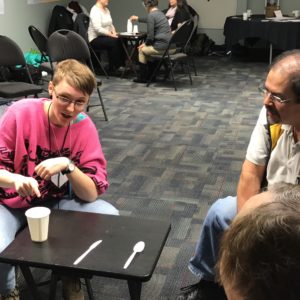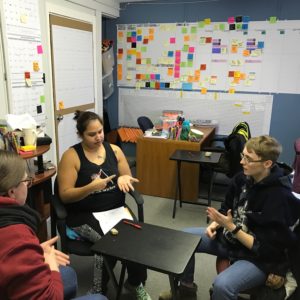As I explained the concept and procedure of a “Bucket Brigade” to twenty-four slightly sleepy sophomores, I became nervous. They seemed nervous, lost, anxious. What if this lesson, which would be their first true foray into WAYK…failed? I pushed on though, remembering the valuable WAYK TQ of “How Fascinating!”—if this lesson failed, I would simply count it as a learning experience and move on. Once the first Lotus group began, though, and students were laughing, and communicating in Latin, and supporting each other, I knew we were in good shape. And then it happened. While we had discussed hunting in the abstract, the students at this point had not yet engaged in any actual hunting….until the last table, when a student re-arranged our props in order to generate the use of a new possessive form, therein adding to our nascent Craigslist. The students were beginning to hunt and pull language all on their own….
Although this is not my first year using WAYK in my classroom, I am especially motivated in the present year to teach my students to hunt and pull language for a number of reasons:
- I want to give my students the means to acquire Latin (and any language, for that mater) in a fun, supportive, and independent manner. I want my learners to know how to move up the scales of proficiency (TQ: Travels with Charlie), with or without my guidance. By teaching students how to hunt and pull language, I hope to instill in them a confidence that they can learn a language while also having fun and building community and relationships in the process. If we truly want our students to become independent language learners, then I can think of no better means than by instructing them how to “hunt” and “pull” language from more proficient speakers.
- I want to challenge my students who need to be challenged. As with any teacher, I find myself in front of a wide variety of students on a daily basis. For those learners who easily excel with the material given, I want to offer a new and exciting opportunity to go beyond the prescribed curriculum and material. I want these students to seek out new bite-size pieces of language, and then serve it up to others. I envision a classroom where these exceptional students are not sitting idly, bored with the lack of challenges, but rather actively creating Set Ups and hunting from both their peers and me for new pieces of language. A student of this caliber will not have to wait for me to hit a certain topic or concept, but will have the necessary skills to seek out anything they wish to know whenever they so desire.
- I want to scaffold my instruction for those students who need the scaffolding. A key philosophy of WAYK is “We all get there together, just maybe not at the same time.” Just as I do not want my advanced students to sit and twiddle their thumbs, I also do not want my students who perhaps need a bit more time with the language to sit silently and feel discouraged. By becoming active language hunters, these students will have the tools necessary both to create the Set Ups that make sense to them, and also to seek out the language that best fills the holes in their pockets. My curriculum will therefore be differentiated so as to allow all levels of students to approach, engage with, and draw from the Latin what they are capable of comprehending and assimilating to prior knowledge at that particular time.
- I want to create students who are active seekers and users of language, rather than passive receptacles of teacher “knowledge”. I do not want my students simply sitting and listening to me speak, but rather actively engaging with the language that we are there to acquire. I want them making mistakes, needing Accent Adjustments, and working to make their Set Ups more Obvious. I want students to give me language in any manner they can at that exact moment. I want my students to know that I will support their use of the language at whatever level they are currently at, and that they can pull from me whatever they need to advance in their proficiency levels.
- I want to create students who are empathetic members of a learning community. One of the best elements of WAYK, in my opinion, is the attention given to creating and fostering dynamic language communities. In a typical highly competitive high school environment, creating a community of trust, risk-taking, and intellectual freedom can be difficult. When students spend most of their time in academic contexts in which the only suitable answer is the correct one, and the person next to you is a friend at lunch but competition in the classroom, it can be challenging to instill in them the notion that a language learning environment can be supportive, not competitive; fun, not boring; challenging, not debilitating, and so on. I want these students to see each other as collaborators and not competitors. By teaching students how both to hunt language and also serve it up to others, my hope is that they will see how much can be gained when we work together towards the common goal of fluency.
It is for all of these reasons and more that I am excited to work this year on teaching my students how to hunt and pull language. While there have been challenges so far, the rewards have been immense. When I asked a student recently if he was enjoying our WAYK sessions, he confirmed that he was, adding simply that using WAYK and speaking naturally (TQ: Be Here Now) felt “more organic” than a typical class period. As the year unfolds and my students develop their hunting skills, I look forward seeing what these young language seekers can teach me about language acquisition, community, and collaborative learning environments. I am also excited to share these experiences with the larger WAYK community, as we all work towards finding the “perfect path” while creating supportive intellectual environments in our language classrooms.
Post authored by Eric.





